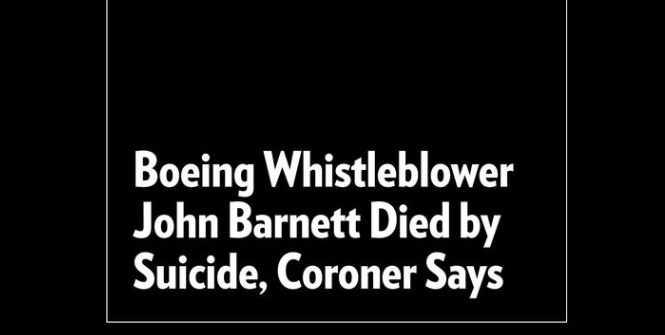
Boeing Whistleblower John Barnett Died by Suicide, Coroner Says
The aviation industry and the world at large are mourning the tragic loss of John Barnett, a former Boeing manager and prominent whistleblower, who passed away earlier this year. On March 9, Barnett, aged 62, was found deceased in Louisiana. Liblens report that the coroner has officially ruled his death a suicide, concluding an investigation that has left many in shock and sorrow.
Barnett’s story is one of courage and dedication. As a long-time employee of Boeing, he held the position of quality-control manager before retiring in 2017. His career was marked by a steadfast commitment to safety and integrity, values that ultimately led him to raise serious concerns about the aircraft manufacturer’s practices. His whistleblower complaints, which he made public, highlighted critical safety issues within Boeing’s production processes, particularly concerning the 787 Dreamliner.
According to Barnett, he discovered discarded metal shavings dangerously close to the wiring of the flight controls on the 787 aircraft. These shavings posed a severe risk, as they could potentially cut through the wiring and cause catastrophic failures. In addition, Barnett identified significant issues with the oxygen systems on the aircraft, claiming that up to 25% of them were defective. His revelations were met with both support and resistance, bringing to light the intense pressures faced by those who speak out against powerful corporations.
The investigation into Barnett’s death revealed that he had been struggling with his mental health for an extended period. His difficulties were exacerbated by the ongoing legal battles related to his whistleblower case. In the days leading up to his death, Barnett had been in Charleston, South Carolina, for depositions connected to his case. A hearing was scheduled for June, and the stress of these legal proceedings had taken a significant toll on him.
“John had identified some serious defects that he felt were not adequately addressed,” said Barnett’s brother, Rodney, in a statement following the news of his passing. “John was deeply concerned about the safety of the aircraft and the flying public.”
Barnett’s death has sparked a renewed conversation about the treatment of whistleblowers and the mental health challenges they often face. Advocates and colleagues remember him as a man of integrity and courage, who was willing to risk his career and personal well-being to ensure the safety of others.
In a statement, Boeing expressed condolences to Barnett’s family but did not address the specific allegations he had raised. “We are deeply saddened by the news of John Barnett’s passing. Our thoughts are with his family and loved ones during this difficult time.”
Barnett’s journey as a whistleblower began when he noticed alarming practices during his tenure at Boeing. His concerns about the safety of the 787 Dreamliner, commonly known as the Dreamliner, were initially raised internally. When he felt these issues were not being properly addressed, he took the brave step of bringing them to the attention of the media and regulatory bodies.
The risks associated with being a whistleblower are well-documented. Individuals who expose wrongdoing within their organizations often face retaliation, isolation, and severe stress. Barnett’s case underscores the need for stronger protections and support systems for whistleblowers, who play a crucial role in maintaining transparency and accountability within industries.
As the aviation community reflects on Barnett’s contributions, his legacy is one of vigilance and an unwavering commitment to safety. His efforts to bring attention to potential hazards within Boeing’s production processes have had a lasting impact on the industry, prompting increased scrutiny and calls for reform.
Barnett’s family has requested privacy during this difficult time, and they have not yet released details about his funeral arrangements. They have expressed their hope that his story will inspire others to continue the fight for safety and integrity in all fields.
“John’s dedication to his work and his courage in speaking out should never be forgotten,” said a family spokesperson. “He believed in doing the right thing, even when it was difficult. We hope that his legacy will encourage others to stand up for what is right.”
In the wake of Barnett’s passing, there has been an outpouring of support from colleagues, friends, and the wider community. Many have taken to social media to share their memories of Barnett and to express their admiration for his bravery. Tributes have highlighted not only his professional achievements but also his personal qualities of kindness, dedication, and unwavering moral conviction.
The aviation industry continues to grapple with the implications of Barnett’s revelations. His whistleblower complaints have prompted investigations and raised awareness about the importance of rigorous safety standards. As the industry moves forward, the lessons learned from Barnett’s experiences will undoubtedly shape future practices and policies.
In conclusion, John Barnett’s death is a profound loss, not only to those who knew him personally but also to the broader community that benefited from his commitment to safety and integrity. His story is a testament to the importance of speaking out against wrongdoing, even in the face of immense pressure. As the investigation into his whistleblower claims continues, Barnett’s legacy will endure, inspiring others to pursue truth and justice in all their endeavors.



